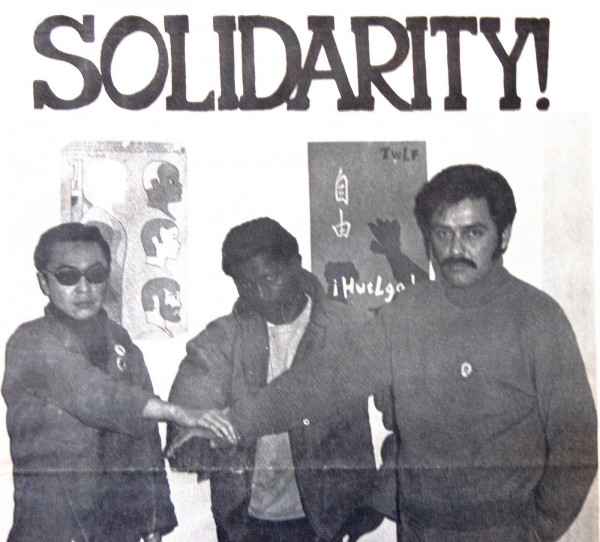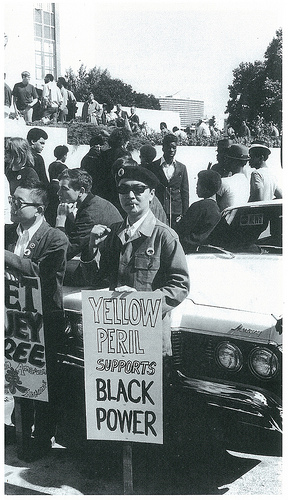So if reporter Seth Rosenfeld was seeking tons of press attention for his new book about the FBI’s war on student activism during the 60s & 70s, he achieved his goal. One day before his book was published, Rosenfeld released an article stating that former Black Panther Richard Aoki had worked as an FBI informant after graduating from high school. My first reaction was to deny it. I’m still not going to fully accept this allegation until more information is published. Because as of now, the allegation is being made based on claims by a former FBI agent (Burney Threadgill) and one document from 1967 that identifies Aoki as an FBI informant, which actually happened to spell his middle name wrong. He was Masato, not Matsui. FBI, get it right.
My favorite commentary on this news so far is one that I came across on tumblr, My Initial Thoughts on the Richard Aoki Controversy, written by Professor Scott Kurashige. Here’s an excerpt:
The simple story of the 1960s—already ripped to shreds by many, many historians—takes everything out of context, as if the US liberals didn’t push Vietnam and the Cold War, as if white suburbanites weren’t already against civil rights and integration, as if there wasn’t a Third World movement for liberation that led US communities of color to see themselves as fighting a war against internal colonialism. By the mid-to-late 1960s, MLK had declared the US government to be world’s greatest purveyor of violence and activists from the center-left to the far-left were looking for ways to transform the street force of the rebellions into disciplined, political organization. The Panthers heightened the political contradictions and the physical confrontations with the police and the state to unprecedented levels. Just as Fanon wrote, they tapped into a sense among the people that white supremacy and imperialism were breeding militant opposition. Aoki provided Huey and Bobby with some of the theoretical readings that guided them when they were Merritt College students and then helped them get guns. But what the white liberals refuse to accept is that young African Americans—sent to die in Vietnam, abused by the occupying force of the police, denied jobs from the shrinking industrial economy, watching nonviolent protestors repeatedly lynched, beaten, and jailed, and portrayed as the enemy by whites guarding their segregated suburbs—did not need any outside force to convince them that America was so rotten at its core that it was time to either burn the whole thing down or organize to overthrow the ruling class. All the liberals could do at this point in history was try to co-opt the insurgent movements in order to preserve their hold on power. Meanwhile the right wing went after the movements with savage ferocity.
Where does Richard Aoki fit into this? My best guess based on the available evidence is that Aoki—like millions of other young people of all races and especially people of color—developed a new identity during the mid-to-late 1960s, renouncing earlier attempts to fit into America and moving instead to be a Third World revolutionary. Had he previously worked for the FBI, he would of course have been tormented by this for the rest of his life. And it’s possible if this ever came out that he would have been discredited (fairly or unfairly) by his movement peers—if it came out during the FBI-heightened internal Panther wars of the late 1960s he might have been killed. Remember that one outrageous tactic COINTELPRO used to discredit Panther members and spur infighting was to send bogus mailings to other Panthers “outing” FBI informants within the BPP!
We all know that institutional powers have always used tactics to create disunity among groups… and this allegation, whether or not it’s true, tries to question what Richard Aoki symbolized for me: multiracial movements and solidarity. To see a fellow Japanese American written into the history of radical civil rights activism and the Black Panthers has always been an inspiration to me, especially because he fiercely rejected stereotypes of the “model minority.”
What makes this claim most unfair is that Richard Aoki isn’t alive anymore to defend himself, since he committed suicide in 2009. Whatever turns out to be the truth, the next generation of Asian Americans who have been inspired by Richard Aoki already exist. And we’ve already been working in multiracial movements, engaging in radical activism, and breaking down those “model minority” myths. So in any case, his life has been and always will be a great legacy for us, and that can’t be questioned.
[Above photo courtesy of Third World Liberation Front: Richard Aoki, Charles Brown, and Manuel Delgado (February, 1969) via Maganda Magazine and right photo courtesy of California Watch]
- Excited
- Fascinated
- Amused
- Disgusted
- Sad
- Angry










